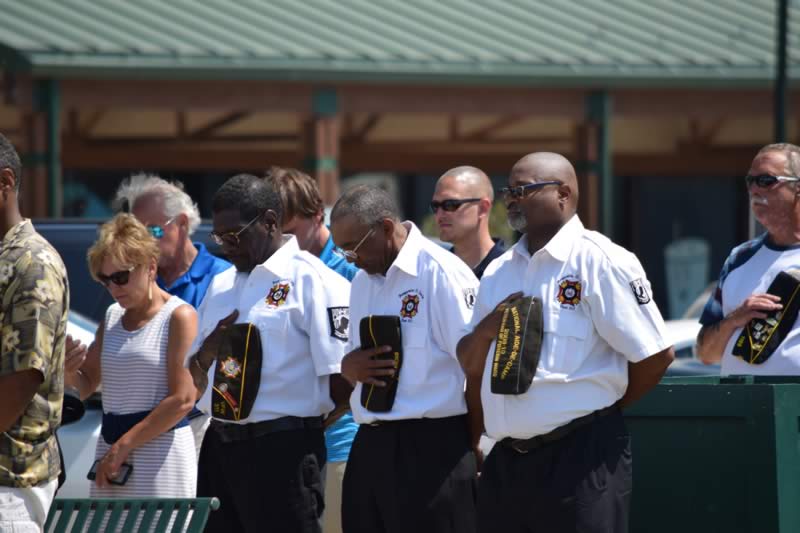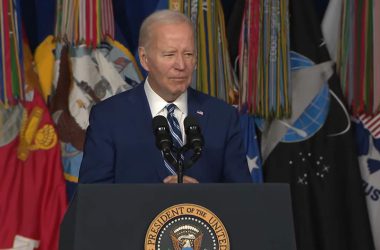Washington, DC—(ENEWSPF)—March 26, 2014. Presenters: Secretary of Defense Chuck Hagel and United Kingdom Secretary of State for Defence Philip Hammond, 2014
SECRETARY OF DEFENSE CHUCK HAGEL: Good morning. I appreciate the opportunity to, once again, welcome Secretary Hammond to the Pentagon. We just completed a very positive and productive meeting, where we reaffirmed the enduring and special relationship between our two nations.
Our main focus today was Ukraine. I thanked Secretary Hammond for the U.K.’s steadfast support of Ukraine’s sovereignty and territorial integrity and for the U.K.’s important contributions to NATO. We reaffirmed the strong commitment of both our countries to NATO’s collective defenses, as President Obama has emphasized throughout his trip to Europe.
There are consequences for Russia’s actions in Ukraine. The economic and diplomatic sanctions announced against Russia by the EU and the United States will further isolate it from the international community. As the leaders of both our countries and the other G-7 nations affirmed this week in the Netherlands, we will continue to coordinate closely on future actions and sanctions we may take against Russia.
We also discussed how the situation in Ukraine will affect NATO going forward, particularly in the context of this year’s NATO summit, which the U.K. will be hosting in Wales this September.
Secretary Hammond and I agreed that the situation in Ukraine underscores the need to continue to demonstrate unity through NATO. The essential character and commitment of this alliance, of its 28 members to one another, remains unchanged, but we will look for new ways to collaborate and improve the alliance’s capabilities and readiness. That means we will make continued necessary investments in defense.
We both recognize that defense budgets come down as wars come to an end. But we also recognize that there is a certain level of investment that any country must continue to make to protect its citizens and honor its security commitments, investments that we are committed to make.
The United States counts on the U.K. as a credible, capable partner with a military that can stand with us through any contingency. And it’s important to the United States that it remains so. As transatlantic partners and leaders in the global community, the United Kingdom and the United States will continue to live up to these commitments and to the responsibilities that go with it.
I’ll now ask Secretary Hammond for his comments, and then we’ll take some questions. Thank you.
U.K. SECRETARY OF STATE FOR DEFENCE PHILIP HAMMOND: Well, thank you. And I’m extremely grateful to Secretary Hagel for welcoming me here again to the Pentagon this morning. It’s good to have an opportunity to catch up on a broad range of issues, although as Secretary Hagel has said, inevitably our discussion has been dominated by the crisis in the Ukraine and Russia’s completely unacceptable and illegal annexation of a sovereign territory.
The U.K., along with our NATO partners, stands shoulder-to-shoulder with the U.S. in opposing this Russian aggression, implementing wide-ranging economic and diplomatic sanctions to force President Putin to stop his bullying behavior. The Russian government should be in no doubt that should there be further acts of aggression, there will be further consequences for Russia.
To reassure our Baltic NATO partners of our resolve to defend their sovereignty and their territorial integrity, I can confirm that in addition to the offer of RAF Typhoon combat jets to bolster the Baltic air policing mission, the U.K. is working with its allies and partners to scope options for additional measures of reassurance to Eastern European and Baltic allies.
Beyond the Ukraine, Secretary Hagel and I discussed the progress of the campaign in Afghanistan and the path towards the end of the ISAF mission in December this year, with drawdown of bases, personnel, and equipment now at a mature stage. There are, of course, many lessons our militaries can learn from their shared experiences on enduring campaigns, and as we finish the ISAF mission in Afghanistan, we are actively planning other ways to continue our deep operational cooperation in the years ahead.
And with budget constraints a real and present factor in both countries, it is incumbent upon us to explore new areas of cooperation, in addition to the existing established joint working in areas such as the F-35, our nuclear deterrence, special forces, intelligence, unmanned aerial vehicles, surveillance aircraft, and carrier strike regeneration, all areas where we have a deep, established collaboration today.
The special relationship remains the cornerstone of U.K. defense policy. The U.K. intends to remain a fully committed, capable and reliable defense partner to the U.S., providing a number of unique specialist capabilities that benefit both countries.
Our shared values, interests, and commitment make us partners of choice. I look forward to progressing our shared agendas and working together to develop further opportunities to deliver enhanced capabilities and improved interoperability in the run-up to the NATO summit in Wales this October — September.
Thank you very much.
REAR ADMIRAL JOHN KIRBY: Okay, folks, we have time for a few questions.
Lita?
Q: Lolita Baldor with AP. Mr. Secretary, you spoke with your Russian counterpart the other day. Would you rule out any additional military incursions by Russia? And is there other U.S. military aid that may or may not be provided to the region, including the Baltics?
And, Mr. Minister, do you think this at all complicates the missile defense effort? And does it raise any either greater complications or increased worries about Russian either response or retaliation as a result of the missile defense?
SEC. HAGEL: In my conversations with Minister Shoygu last week, I asked him specifically why the Russians were building up their western border and I asked him specifically what the intentions were as to that build up. He told me that they had no intention of crossing the border into Ukraine. I told him that we looked forward to the Russians living up to their word, if that was the case. But the reality is, they continue to build up their forces. So they need to make sure that they stay committed to what Minister Shoygu told me.
As to continued assistance to the Ukrainian government, I think most of you know that the MREs have been approved, they’re on their way. The president’s national security team is reviewing all of the other requests for assistance, particularly the non-lethal assistance to Ukraine.
SEC. HAMMOND: Well, the missile defense program is, of course, not aimed at Russia, and we’ve always been very clear about that. It’s aimed at rogue states, particularly the possibility of Iran developing longer-range ballistic missiles. And in terms of any Russian response, since the Russians know and understand very well that the ballistic missile — or the missile defense program is not a counter-Russian program, as a matter of policy and as a matter of technical fact, any response — any heightened response would be a rhetorical one, a matter of politics, rather than a matter of real concern. They know what this program is. They know what it’s aimed against, and it isn’t aimed against them.
REAR ADM. KIRBY: Next question, Joan?
Q: Gentlemen, if I could ask, Mr. Hammond, you mentioned this morning at a briefing at the embassy that perhaps the Russian counterpart that Secretary Hagel was referring to in that phone call may not ultimately be able to control (inaudible) that are given by President Putin. And to that end, do you feel like there really should be such confidence placed in this gentleman being able to keep his word, bearing in mind, as you said, the build-up continues on the border? And should we be at a point of higher concern with this build-up?
SEC. HAMMOND: Well, I think what I said this morning was that all the evidence suggests that the Russian agenda is being very much run by President Putin personally. And other Russian players, including Minister Shoygu, may express views, but it’s a moot point, and we cannot know, we do not know to what extent all of those people are really inside the inner circle in which President Putin is planning this exercise.
REAR ADM. KIRBY: Barbara?
Q: For both of you gentlemen, since both of your governments have been involved in advising and working with the Malaysians on their search for Flight 370, I wanted to ask both of you, in your minds, can you now rule out that it was either an act of terrorism or political violence? Is that still a possibility in the view of your governments?
And the fact that the airliner, we now know, flew without a transponder for some period of time, to both of you, does this present any concerns about the technical security of airspace in your countries? Is there anything you’re doing to look at that? And I ask that because, of course, the Israelis already have, but the terrorism question, please.
SEC. HAGEL: Phil, do you want to…
SEC. HAMMOND: You go ahead.
SEC. HAGEL: Okay. On the terrorism question, I don’t think at this point we can rule anything in or out. I think we have to continue to search, as we are. And you know the United States continues to stay committed. We have aircraft in the area, working out of Malaysia and Perth. As you know, we have moved two of our most sophisticated locators to the Perth area. So until we have more information, we don’t know.
On a couple of your other points, what does this mean for the future? What are we doing to prepare? I think any country — and I can only speak for the United States — always is evolving and is always recognizing new challenges and threats and trying to anticipate those. That’s the mission of this enterprise, security of this country, working with all our interagency partners, intelligence, homeland security.
So the world is dangerous. We recognize that. There are new threats coming at us in different ways all the time. So you have to continue to prepare.
I think, too, it’s important — just one last point on this, Barbara — recognizing, as we all do, what the families are going through here. And we’re doing all the things we can possibly do in this area of search. And we also recognize that the humanity of this is important, as well. But we just don’t know.
SEC. HAMMOND: Well, I agree with Secretary Hagel. We cannot rule out anything at this stage. And until — unless and until we recover the cockpit voice recorder, we will not know for certain, and that search goes on, and we, too, are assisting in the search, and we just have to hope that we will be successful in locating that vital piece of evidence.
You asked a question about whether we should be alarmed by the fact essentially that this flight was able to proceed for a number of hours without a transponder operational. But, of course, it did so over a piece of empty ocean. It would have been detected had it been flying within the range of primary radars.
So I don’t think that in itself raises particular concerns for us because of the flight path that appears to have been chosen. We were, of course, able to track the presence of the aircraft on the Inmarsat satellite, which is how we know that it remained in the air for the period that it did. But hopefully, in due course, we’ll recover the flight recorders and then have a much clearer picture of what really happened.
Q: I understand that. But I’m just — and I’m realizing it flew over empty ocean. Nonetheless, it is an aircraft that was able to do this. Does — because the Israelis for some reason believe this now poses a concern to their airspace, that they seem to be the only country that’s responded, I’m just wondering if you have seen anything technically, not in terms of the human threat, but technically where you say, do we need to tighten up our airspace rules? Do we need to worry about this now as a technical issue to ensure airspace security over your respective countries?
SEC. HAMMOND: Well, the United Kingdom by its geography has a rather smaller area of airspace to worry about than the southern Indian Ocean, but I am — I remain completely confident that any aircraft of any type flying without a transponder operational in U.K. airspace would be detected and intercepted immediately.
REAR ADM. KIRBY: This will be our last question. David?
Q: Thank you. I wonder how you effectively reassure European allies that, in fact, NATO will protect them, take action? When you have — Russia seems to have gobbled up a piece of Ukraine and gotten away with it. Have they, in fact, gotten away with it? Is there anything — what’s to keep them from going further?
SEC. HAGEL: Well, first, I think much of the focus of President Obama’s conversations here the last few days in Europe with our EU partners and our NATO partners have been focused on that issue. As you know, we have been also emphasizing the diplomatic, economic aspects of how we deal with Russia.
I think it’s pretty clear that the isolation that Russia is bringing on to itself is going to have significant consequences for that country. And NATO is, as you know, a collective security organization that consists of 28 members, all committed to each other’s security. And I have no doubt — I don’t think any member of NATO has any doubt — that all 28 members are prepared to come to the security interests, if that’s what’s required, to defend the integrity and sovereignty of those member countries.
I think the reality of what we’re seeing here is going to really much define for the future the significance of NATO. NATO has been, I suspect, history’s most successful collective security institution. And there have been questions over the last few years, relevant questions, whether there’s a need for NATO. What is the mission of NATO now?
Well, I think it’s pretty clear that the world is not as secure and peaceful and placid as once envisioned by some. And I think that is going to reset much of what NATO’s continued responsibilities will be and, as I mentioned in my comments, the investments required by NATO members to assure that the investments that each of those NATO countries makes in the security of not just collective security of NATO, but in their own security, is going to have to be reviewed.
We’re under intense budget pressures here. I know Secretary Hammond’s budgets are the same. There’s no country that is not without that kind of budget focus and pressure.
But it is a matter of prioritizing what’s important to your country. And certainly national security and defense are the number-one priorities of any government and any leader. So I think what we’re seeing is going to reset NATO for the next few years in a very good way, an effective way.
SEC. HAMMOND: Well, I agree with what Secretary Hagel has said. I think in the run-up to the NATO summit, if anyone was wondering about the purpose of NATO, the events of the last few weeks have clarified very much that NATO still has an essential purpose in our collective defense.
And the steps that we are taking to provide reassurance to the Eastern European and Baltic NATO members are a reminder of what Article 5 means to anybody who needed reminding about it. We are very clear that Article 5 remains at the heart of NATO’s purpose and mission.
In terms of the broader question, you said, have they gotten away with it? What has happened is an illegal act, a referendum at the point of a bayonet, an illegal annexation. We will not allow that to stand. The international community will not recognize what has happened as a status quo that will be allowed to stand. There will be consequences for Russia, economic, diplomatic, and otherwise, but it is important that we have a calibrated range of responses available in order to deter any further aggression by Russia against the Ukraine, and we’ve set out our positions partly as a response to what has already happened, but also with a focus on the practical need to deter any further aggression.
REAR ADM. KIRBY: Thank you very much, folks.
SEC. HAMMOND: Thank you.
SEC. HAGEL: Thank you.
Source: defense.gov








